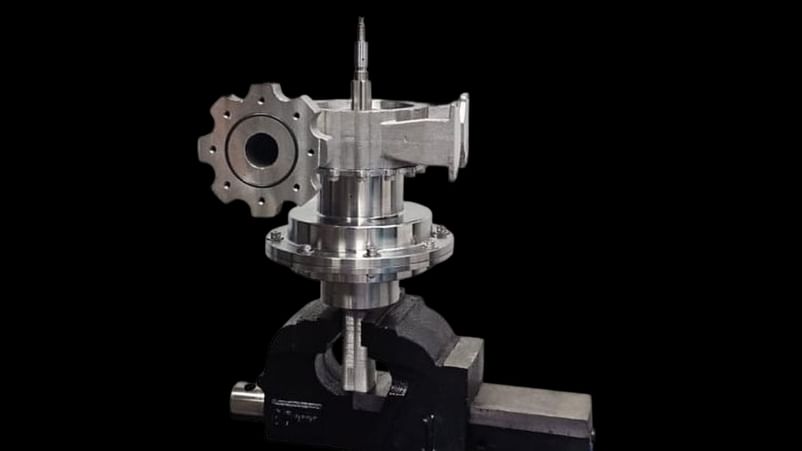Science
Astrophel Aerospace Develops Indigenous Cryogenic Pump for Astra C1

Astrophel Aerospace has made significant strides in the aerospace sector by developing an indigenous cryogenic pump for its Astra C1 rocket. This advancement positions the company among the few New Space startups in India to achieve such a feat, highlighting the nation’s growing capabilities in advanced propulsion technologies.
The cryogenic pump consists of over fifty precisely engineered components, capable of operating at 25,000 RPM. Astrophel plans to implement a fully-fledged turbopump in both the first and second stages of the Astra C1 rocket. For context, approximately eight to nine turbopumps are required for the first stage of the Indian Space Research Organisation’s (ISRO) Small Satellite Launch Vehicle (SSLV) during liftoff.
Despite its compact size—comparable to that of a one-litre bottle—the cryogenic pump generates between 100 and 150 horsepower, similar to that of a family car. The turbopump currently under development by Astrophel is projected to deliver between 500 and 600 horsepower for larger launch vehicles. This pump is instrumental in providing high-pressure cryogenic fuel to rocket engines, thereby reducing material costs and facilitating efficient thrust control.
Astrophel Aerospace employs lean manufacturing principles derived from the automotive industry, ensuring cost efficiency, rapid assembly, and scalable production. This approach marks a notable departure from the conventional methods adopted by many New Space startups in India, which often utilize 3D-printed electric pumps for their launch vehicles.
As India’s New Space sector expands, Astrophel Aerospace seeks to meet the rising demand for deploying microsatellites and nanosatellites. The company is collaborating with ISRO on the testing and certification process for its cryogenic pump, with co-founder Suyash Bafna stating, “This milestone is a testament to how India can indigenously develop advanced propulsion technologies at a fraction of global costs. ISRO’s certification will validate not just our pump, but India’s ability to innovate world-class space hardware with global export opportunities.”
The upcoming stages for the cryogenic pump include further testing and certification by ISRO. Additionally, Astrophel Aerospace is in the process of signing a Memorandum of Understanding (MoU) with a US-based partner. The company is also exploring international collaborations to facilitate exports at the sub-component level, targeting both the space industry and sectors handling cryogenic liquids.
This development not only underscores the potential of Indian startups in the aerospace field, but it also enhances the country’s standing as a competitive player in the global space industry. As Astrophel Aerospace continues to innovate and expand its capabilities, it aims to contribute significantly to the future of space exploration and satellite deployment.
-

 Health3 months ago
Health3 months agoNeurologist Warns Excessive Use of Supplements Can Harm Brain
-

 Health3 months ago
Health3 months agoFiona Phillips’ Husband Shares Heartfelt Update on Her Alzheimer’s Journey
-

 Science2 months ago
Science2 months agoBrian Cox Addresses Claims of Alien Probe in 3I/ATLAS Discovery
-

 Science2 months ago
Science2 months agoNASA Investigates Unusual Comet 3I/ATLAS; New Findings Emerge
-

 Science1 month ago
Science1 month agoScientists Examine 3I/ATLAS: Alien Artifact or Cosmic Oddity?
-

 Entertainment5 months ago
Entertainment5 months agoKerry Katona Discusses Future Baby Plans and Brian McFadden’s Wedding
-

 Science1 month ago
Science1 month agoNASA Investigates Speedy Object 3I/ATLAS, Sparking Speculation
-

 Entertainment4 months ago
Entertainment4 months agoEmmerdale Faces Tension as Dylan and April’s Lives Hang in the Balance
-

 World3 months ago
World3 months agoCole Palmer’s Cryptic Message to Kobbie Mainoo Following Loan Talks
-

 Science1 month ago
Science1 month agoNASA Scientists Explore Origins of 3I/ATLAS, a Fast-Moving Visitor
-

 Entertainment2 months ago
Entertainment2 months agoLewis Cope Addresses Accusations of Dance Training Advantage
-

 Entertainment3 months ago
Entertainment3 months agoMajor Cast Changes at Coronation Street: Exits and Returns in 2025









